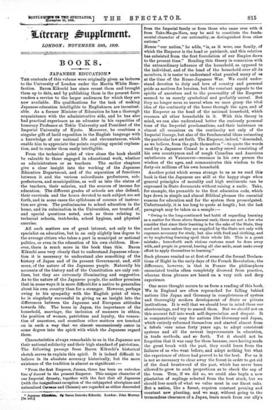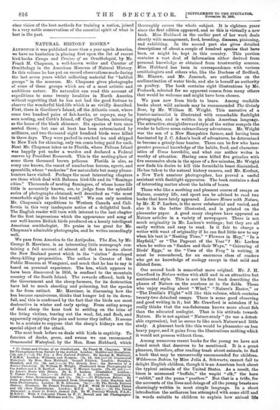BOOKS.
7.A.PANESE EDUCATION.* THE contents of this volume were originally given as lectures to the University of London under the Martin White Bene- faction. Baron Kikuchi has since recast them and brought them up to date, and by publishing them in the present form renders a service to the larger audiences for which they are now available. His qualifications for the task of making Japanese education intelligible to Englishmen are incontest- able. As a former Minister of Education he has a thorough acquaintance with the administrative side, and he has also had practical experience as an educator in his capacities of honorary Professor at Tokio University and President of the Imperial University of Kyoto. Moreover, he combines a singular gift of lucid exposition in the English language with a knowledge of our national life and circumstances, which enable him to appreciate the points requiring special explana- tion, and to render them easily intelligible.
From the technical point of view alone the book should be valuable to those engaged in educational work, whether as administrators or as teachers. The earlier chapters give a clear insight into the working of the Japanese Education Department, and of the separation of functions between it and the various subordinate prefectures, sub- prefectures, and municipalities, as well as into the status of the teachers, their salaries, and the sources of income for education. The different grades of schools are also defined, their curricula and the hours devoted to each subject are set forth, and in some cases the syllabuses of courses of instruc- tion are given. The preliminaries to school education in the home, and its culmination in the Universities, are treated of, and special questions noted, such as those relating to technical schools, text-books, school hygiene, and physical exercise.
All such matters are of great interest, not only to the specialist on education, but in an only slightly less degree to the average citizen who takes a part in municipal or national politics, or even in the education of his own children. How- ever, there is much more in the book than this. Baron Kikuchi sees very clearly that to understand Japanese educa- tion it is necessary to understand also something of the history of Japan and of its present Government, and, still more, of the nature of the Japanese people. Naturally his accounts of the history and of the Constitution are only out- lines, but they are extremely illuminating and suggestive. As to the nature of the Japanese people, the author premises that in some ways it is more difficult for a native to generalise about his own country than for a stranger. However, perhaps owing to his sympathy with the English point of view, he is singularly successful in giving us an insight into the differences between the Japanese and European attitudes towards life. The home in Japan, the importance of the household, marriage, the inclusion of manners in ethics, the position of women, patriotism and loyalty, the venera- tion of ancestors, and countless other matters are touched on in such a. way that we almost unconsciously enter: in some degree into the spirit with which the Japanese regard them.
Characteristics always remarkable to us in the Japanese are their national solidarity and their high standard of patriotism. The following passage from Baron Kikuchi's historical sketch serves to explain this spirit. It is indeed difficult to believe in its absolute accuracy historically, but the mere exuatenc,e of the tradition is almost as significant :—
"From the first Emperor, Jimmu, there has been an unbroken tine of descent to the present Emperor. This unique character of our Imperial dynasty, together with the fact that all Japanese (with the insignificant exception of the subjugated aborigines and naturalised Careens and Chinese) are regarded as either descended • Japanese EasostmM, Eir Baron Dairokn IrikuniaL London: John itarray.1 [5s. net.]
from the Imperial family or from those who came over with it from Taku-Ida-ga-Hara, may be said to constitute the funda- mental character of our nationality, as distinguished from other nations."
Hence "our nation," he adds, "is, as it were, one family, of which the Emperor is the head or patriarch, and this relation has subsisted from the first foundation of our Empire down to the present time." Reading this theory in connexion with the extraordinary influence of the household, as opposed to the individual, and of the head of the household over all its members, it is easier to understand what puzzled many of us at the time of the Russo-Japanese War. We could under- stand devotion to duty and love of country and personal pride as motives for heroism, but the constant appeals to the spirits of ancestors and to the personality of the Emperor seemed to us merely symbolical and probably unreal. But they no longer seem so unreal when we once grasp the vital idea of the continuity of the home through the ages, and of the Emperor as the head of the national household, which resumes all other households in it. With this theory in mind, we can also understand better the curiously personal tone of the Imperial proclamations, and their insistence on almost all occasions on the continuity not only of the Imperial lineage, but also of the fundamental ideas animating the particular law set forth. The Emperor, indeed, "descended, as we believe, from the gods themselves "—to quote the words used by a Japanese Consul to a motley crowd consisting of his own countrymen and of rough Canadian and American unbelievers at Vancouver—resumes in his own person the wisdom of the ages, and communicates this wisdom to the forty-six millions of his own household.
Another point which seems strange to us as we read this book is that the Japanese are still at the happy stage when general principles of morality and high sentiments can be expressed in State documents without raising a smile. Take, for example, the preamble to the first education code, which lays down in simple and almost Biblical phrases the essential reasons for education and for the system then promulgated. Unfortunately, it is too long to quote at length ; but the last paragraph may be taken as a sample :—
"Owing to the long-continued bad habit of regarding learning as a matter for those above Samurai rank, there are not a few who consider that since their learning is for the sake of the State, they need not learn unless they are supplied by the State not only with expenses necessary for study, but also with food and clothing, and so by neglecting learning spoil their whole life. This is a great mistake ; henceforth such vicious customs must be done away with, and people in general, leaving all else aside, must make every effort to apply themselves to learning."
Such phrases remind us at first of some of the formal Declara- tions of Right in the early days of the French Revolution; the difference, however, is that in France the philosophers enunciated truths often completely divorced from practice, whereas these phrases are based on a very rich and deep experience.
One more thought occurs to us from a reading of this book. We in England are often reproached for falling behind nations like Japan and Germany in completeness of system and thoroughly modern development of State or private institutions. It is well that we should bear in mind these our shortcomings, and try to amend them. But we should not on this account fall into weak self-depreciation and despair. It is comparatively easy for nations like Germany and Japan, which- entirely reformed themselves and started almost from 1i —tabula, "rola "isclme &Ay "year d ago; to adopt consistent systems and all the newest improvements in education, in trade methods, and so forth. Yet it should not be forgotten that it was easy for them because, once having made the great break with the past, they could learn from the failures of us who Went before, and adopt nothing but what the experience of others had proved to be the best. For us it is not so necessary to clear away the forest in order to get rid of the dead brushwood of the past, which has never been allowed to grow to such proportions as to check the sap of the trees. True, if we did so, we could also begin a new plantation of saplings selected from the best stock, but we should lose much of what we value most in our finest oaks. But a nation, like a forest, requires constant pruning and constant new planting, and we may, without going to the tremendous clearance of a Japan, learn much from our ally's
clear vision of the best methods for training a nation, joined to a very noble conservatism of the essential spirit of what is best in the past.

























































 Previous page
Previous page